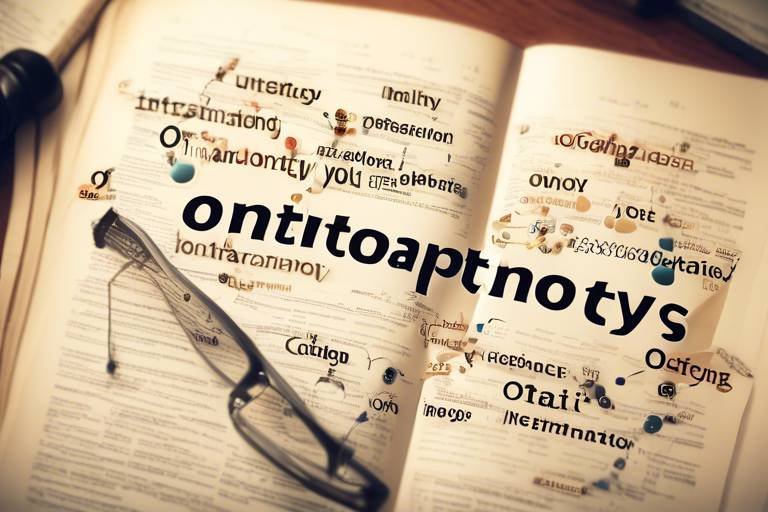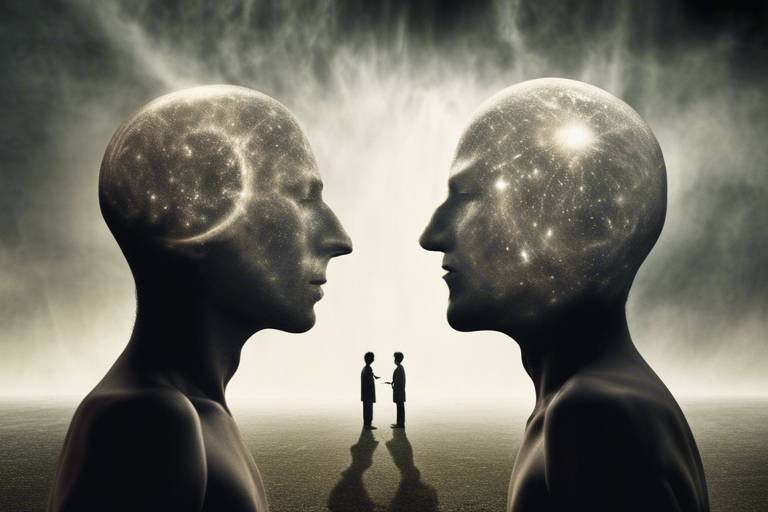Does Ontology Matter in Everyday Life?
Exploring the significance of ontology in our daily experiences, this article delves into how our understanding of existence impacts our interactions, beliefs, and decision-making processes. You might be wondering, what exactly is ontology? At its core, ontology is the philosophical study of being and existence. It asks profound questions like "What is real?" and "What does it mean to exist?" These questions might sound abstract, but they actually play a crucial role in shaping our everyday lives. Think about it: the way we perceive ourselves, our relationships, and even our choices can be traced back to our ontological beliefs.
Imagine walking into a room filled with people. Your perception of who you are in that space—whether you feel confident, anxious, or indifferent—is influenced by your understanding of your own existence and identity. This interplay between ontology and self-perception is not just a philosophical exercise; it has real-world implications. When we start to examine our beliefs about what it means to be, we can uncover layers of meaning in our interactions and decisions.
Moreover, ontology isn't just a solitary journey of self-discovery. It extends into our relationships with others. When two people come together, they bring their own ontological perspectives, which can either foster deep connections or create misunderstandings. For instance, if one person believes in a deterministic view of existence while the other champions free will, their conversations might be filled with friction rather than harmony. This is why understanding ontology can be a game-changer in how we relate to one another.
In our fast-paced world, where decisions are made in the blink of an eye, the influence of ontology becomes even more pronounced. Every choice we make, whether in our personal lives or professional settings, is tinged with our beliefs about existence. Do we see ourselves as active participants in shaping our fate, or do we feel like mere spectators in a predetermined play? This fundamental question can guide our actions and reactions in ways we may not even realize.
To illustrate this point, consider the realm of ethics. Our ontological beliefs inform our moral frameworks, guiding us in determining what is right or wrong. If we believe that all beings have inherent value, our choices will reflect that belief. Conversely, if we view existence as a competition for survival, our ethical decisions might lean toward self-interest. This is why ontology is not just an abstract concept; it has tangible effects on how we navigate the complexities of life.
In conclusion, ontology matters profoundly in our everyday lives. It shapes our identities, influences our relationships, and guides our decision-making processes. By understanding and reflecting on our ontological beliefs, we can gain deeper insights into ourselves and the world around us. So, the next time you find yourself pondering the nature of existence, remember: these reflections are not just philosophical musings; they are the keys to unlocking a more meaningful, connected life.
- What is ontology? Ontology is the branch of philosophy that studies the nature of being, existence, and reality.
- How does ontology affect personal identity? Our understanding of existence shapes our self-perception and influences how we interact with others.
- Can ontology impact decision-making? Yes, our beliefs about reality influence the choices we make in both personal and professional contexts.
- Why is ontology important in relationships? Different ontological beliefs can create either connections or barriers in interpersonal relationships.

The Basics of Ontology
Ontology, at its core, is the philosophical study of being and existence. It tackles questions like "What is there?" and "What does it mean to exist?" This may sound abstract, but ontology is deeply woven into the fabric of our everyday lives. Just think about it: every time you make a decision, whether it's about what to eat for breakfast or which career path to pursue, you're engaging with ontological concepts, consciously or not.
To break it down further, ontology can be seen as a framework that categorizes and defines the various entities in our reality. It helps us understand not only the physical world but also the abstract concepts that govern our thoughts and beliefs. For instance, ontology distinguishes between different kinds of entities, such as:
- Concrete objects: These are tangible items we can touch and see, like trees, cars, and people.
- Abstract concepts: These include ideas and emotions, such as love, justice, and time, which cannot be physically grasped.
- Social constructs: These are the frameworks created by society, such as laws, norms, and roles, which shape our interactions and behaviors.
Understanding ontology is crucial because it influences how we interpret our experiences and the world around us. For example, consider the impact of different ontological beliefs on culture. In some cultures, the existence of spirits and ancestors plays a significant role in daily life, while in others, a more scientific and materialistic view prevails. This divergence in ontological perspectives leads to vastly different ways of living, social structures, and even conflict resolution.
Moreover, ontology isn't just philosophical jargon; it has practical implications in various fields. In computer science, for instance, ontologies are used to create frameworks for data organization and retrieval. In healthcare, understanding the ontology of diseases can improve diagnosis and treatment strategies. Thus, grasping the basics of ontology empowers us to navigate our lives more effectively, making informed decisions based on our understanding of existence and reality.
In summary, ontology is a vital element of our daily experiences that shapes our perceptions, beliefs, and interactions. By diving into its basics, we can better appreciate how our understanding of being influences everything from personal identity to societal norms. It's like having a lens through which we can view the complexities of life, helping us make sense of our experiences and the world we inhabit.

Ontology in Personal Identity
When we think about ontology, it might seem like a lofty philosophical concept, but it has profound implications for our personal identity. In essence, ontology is the study of being and existence, and it shapes how we perceive ourselves and our place in the world. This section delves into the intricate relationship between ontology and personal identity, revealing how our understanding of existence influences our self-perception, beliefs, and interactions with others.
At the heart of personal identity lies the question: "Who am I?" This question is not merely about names or titles; it goes deeper, probing into the essence of what makes us, *us*. Our ontological beliefs—how we define existence and what it means to be—play a crucial role in answering this question. For instance, if one believes that our essence is tied to our consciousness, they may prioritize self-awareness and introspection in their identity formation. Conversely, if someone views identity as a social construct, their sense of self may be heavily influenced by societal expectations and norms.
Our self-perception is intricately linked to our ontological views. When we embrace a particular understanding of existence, it shapes our thoughts, actions, and interactions with others. For example, consider someone who believes in the concept of a fixed self—someone who sees their identity as static and unchanging. This belief may lead to a rigid self-image, causing them to resist change and growth. On the other hand, an individual who views identity as fluid and evolving may be more open to new experiences and personal development.
Existential questions often arise from our ontological perspectives. Questions like "What is the meaning of life?" or "Why do I exist?" can significantly influence our motivations and life choices. For instance, someone who sees life as inherently meaningful may pursue goals with vigor and passion, while another who perceives existence as random may struggle to find purpose. These philosophical inquiries are not just abstract musings; they resonate deeply within us, guiding our actions and decisions daily.
Our ontological beliefs extend beyond self-perception and existential questions; they also play a vital role in shaping our relationships with others. When two individuals have differing ontological views, it can create barriers or foster connections. For example, a person who values individualism may find it challenging to relate to someone who prioritizes collectivism. Understanding these differences can lead to more profound empathy and communication, as we recognize that our perceptions of existence influence how we connect with one another.
Moreover, ontology influences social constructs, which are the frameworks through which we understand and navigate our world. These constructs—such as gender roles, cultural norms, and moral values—are shaped by our collective ontological beliefs. For instance, if society widely embraces the idea that identity is fluid, it may lead to more inclusive views on gender and sexuality. Conversely, a rigid ontological perspective can reinforce stereotypes and limit individual expression. By examining these constructs through an ontological lens, we can better understand the dynamics of society and our place within it.
In summary, ontology plays a pivotal role in shaping our personal identity, influencing our self-perception, relationships, and social constructs. By engaging with these ideas, we can gain deeper insights into ourselves and the world around us, ultimately leading to more authentic and meaningful lives.
- What is the relationship between ontology and personal identity?
Ontology shapes our understanding of existence, which in turn influences how we perceive ourselves and our identities. - How do ontological beliefs affect our relationships?
Differences in ontological views can create barriers or foster connections, impacting how we relate to others. - Can ontology influence societal norms?
Yes, collective ontological beliefs shape social constructs, affecting cultural norms and values. - How can understanding ontology help in personal development?
By exploring our ontological beliefs, we can gain insights into our motivations and choices, leading to personal growth.

Self-Perception and Ontology
When we think about our self-perception, it’s almost like peering into a mirror that reflects not just our physical appearance but also our inner thoughts, beliefs, and feelings. At the heart of this reflection lies ontology—the philosophical study of being and existence. It’s fascinating to consider how our understanding of what it means to 'be' shapes our self-image. For instance, if you believe that your essence is tied to your accomplishments, then your self-worth may fluctuate with your achievements. Conversely, if you see your value as inherent and unchangeable, your self-perception might remain steady, regardless of external circumstances.
Ontology influences our thoughts and actions profoundly. Think about it: when you view yourself through an ontological lens that emphasizes interconnectedness with others, you may become more empathetic and understanding. This perspective can lead to healthier relationships and a more fulfilling life. On the other hand, if your ontology is rooted in isolation and individualism, you might find yourself struggling to connect with others, leading to feelings of loneliness or inadequacy.
Moreover, the existential questions we grapple with—like "Who am I?" and "What is my purpose?"—are deeply intertwined with our ontological beliefs. These inquiries not only shape our self-perception but also guide the paths we choose in life. When we confront these fundamental questions, we often find ourselves at a crossroads, where our decisions reflect our understanding of existence. For example, someone who believes in a predetermined destiny might approach life differently than someone who believes in free will.
In essence, our self-perception is not merely a product of our experiences; it is a complex interplay of our ontological beliefs and how we choose to interpret our existence. This can lead to various outcomes in our lives, such as:
- Confidence: A strong sense of self can lead to greater confidence in social situations.
- Resilience: Understanding the transient nature of existence can foster resilience in the face of adversity.
- Growth: Embracing a fluid identity encourages personal growth and adaptability.
Ultimately, our self-perception, shaped by ontology, serves as a lens through which we view the world. It colors our interactions and influences our decisions, making it a crucial aspect of our daily lives. Just as a painter chooses specific colors to express their vision, we select our beliefs about existence to create our unique self-portrait.
- What is ontology? Ontology is the philosophical study of the nature of being, existence, and reality.
- How does ontology affect self-perception? Our beliefs about existence shape how we see ourselves, influencing our confidence, relationships, and life choices.
- Can understanding ontology improve my life? Yes, by understanding your ontological beliefs, you can gain insights into your motivations and enhance your decision-making processes.

Existential Questions
When we dive into the realm of , we are really peeling back the layers of what it means to be human. These questions often revolve around the essence of our existence, the purpose of life, and the nature of reality itself. You might find yourself pondering things like, "Why am I here?" or "What happens after I die?" These inquiries can be both exhilarating and daunting, as they challenge us to think deeply about our place in the universe.
At the heart of these existential musings lies the ontological perspective, which shapes how we perceive our existence and the world around us. For instance, consider the following existential questions that many of us grapple with:
- What is the meaning of life?
- Do we have free will, or is everything predetermined?
- Is there a higher power or purpose guiding us?
- What does it mean to live a good life?
These questions can serve as a double-edged sword. On one hand, they can lead to profound insights and personal growth; on the other, they can spark feelings of anxiety and uncertainty. The way we confront these questions often reflects our ontological beliefs. For example, someone who believes in a predetermined universe may approach life's challenges with a sense of resignation, while someone who embraces free will might feel empowered to carve their own path.
Moreover, the search for answers to these existential questions can significantly influence our motivations and life choices. When we find meaning in our struggles, we are more likely to persevere through tough times. Conversely, a lack of clarity can lead to feelings of aimlessness or despair. It's fascinating how these philosophical inquiries can shape everything from our career paths to our relationships.
In essence, grappling with existential questions is a fundamental aspect of the human experience. They compel us to reflect on our values, aspirations, and the legacies we wish to leave behind. By engaging with these questions, we not only enhance our self-awareness but also foster a deeper connection with others who share similar quests for understanding. So, the next time you find yourself lost in thought about the mysteries of existence, remember that you're not alone; we are all navigating this intricate tapestry of life together.

Impact on Relationships
When we talk about ontology and its impact on relationships, we're diving into a fascinating realm where our understanding of existence shapes how we connect with others. Think about it: our beliefs about who we are and what it means to exist influence the way we interact with friends, family, and even strangers. If we perceive ourselves as inherently connected to others, we may approach relationships with more empathy and openness. On the flip side, if we see ourselves as isolated beings, we might struggle to form deep connections.
Moreover, the differences in ontological beliefs can create significant barriers in relationships. For instance, consider two friends who have contrasting views on existence. One might believe in a deterministic universe where everything is preordained, while the other might champion free will. These differing perspectives can lead to misunderstandings and conflicts, especially when making plans or discussing life choices. This is where the saying "you see the world through your own lens" comes into play. Each person's lens is shaped by their ontological beliefs, affecting how they interpret actions and words.
Another layer to this discussion is the role of social constructs in shaping our relationships. Our ontological views often dictate the norms and values we hold dear, which can either strengthen or weaken our connections with others. For example, in cultures where collectivism is valued, relationships may be prioritized over individual desires. In contrast, more individualistic societies may foster a sense of independence that can sometimes lead to feelings of isolation. Understanding these dynamics can help us navigate our interactions more effectively.
Ultimately, the impact of ontology on relationships is profound and multi-faceted. It can foster deep connections or create rifts based on differing beliefs about existence. By recognizing how our perceptions shape our interactions, we can strive to build more meaningful and empathetic relationships. So, the next time you find yourself in a disagreement with someone, take a moment to consider their ontological perspective. You might just find that understanding their view can bridge the gap between you.
- What is ontology? Ontology is a branch of philosophy that studies concepts such as existence, being, and reality. It helps us understand the nature of things and their relationships.
- How does ontology affect personal identity? Our ontological beliefs shape how we perceive ourselves and our place in the world, influencing our self-image and interactions with others.
- Can differing ontological beliefs impact relationships? Yes, contrasting views on existence can lead to misunderstandings and conflicts in relationships, affecting communication and connection.
- What role does ontology play in decision-making? Ontological beliefs inform our understanding of reality, which can significantly influence our choices in personal and professional contexts.

Social Constructs and Ontology
When we think about the world around us, it's fascinating to realize that much of what we perceive is not just a reflection of reality, but rather a complex web of social constructs shaped by our ontological beliefs. Ontology, the study of being and existence, plays a crucial role in how we understand and interpret these constructs. For instance, concepts like gender, race, and class are not merely biological or economic categories; they are deeply embedded in our cultural narratives and shaped by our collective understanding of existence.
Consider how different societies define what it means to be a man or a woman. These definitions are heavily influenced by ontological assumptions about identity and existence. In some cultures, gender is viewed as a binary construct, while in others, it is seen as a spectrum. This divergence in understanding not only affects individual identities but also influences laws, social norms, and interpersonal relationships. The way we categorize and interact with different identities can either foster inclusivity or perpetuate division, highlighting the profound impact of ontology on our social fabric.
Furthermore, ontology shapes our collective behavior and societal values. For example, when we view existence through a materialistic lens, we might prioritize wealth and consumption over community and connection. Conversely, an ontological perspective that values interconnectedness might lead to a society that emphasizes sustainability, empathy, and mutual support. This shift in understanding can transform our interactions and priorities, leading to a more harmonious existence.
To illustrate this further, let’s look at how different ontological beliefs can manifest in societal constructs:
| Ontology Perspective | Social Construct Example | Impact on Society |
|---|---|---|
| Materialism | Consumerism | Increased inequality, focus on wealth accumulation |
| Interconnectedness | Community Engagement | Stronger social bonds, emphasis on collaboration |
| Individualism | Personal Achievement | Competition, potential neglect of communal needs |
| Collectivism | Shared Responsibility | Focus on group welfare, inclusive policies |
As we navigate our daily lives, it’s essential to recognize how our ontological beliefs shape the social constructs we engage with. By questioning and reflecting on these beliefs, we can challenge existing norms and potentially reshape our society for the better. This exploration encourages us to think critically about the values we uphold and the impact they have on our interactions with others.
In conclusion, ontology is not just an abstract philosophical concept; it is a vital part of our everyday existence. Understanding how our beliefs about being influence social constructs can empower us to create a more inclusive and equitable world. It invites us to reconsider the foundations of our identities and societal norms, ultimately leading to a richer, more nuanced understanding of ourselves and each other.
- What is ontology? Ontology is the philosophical study of the nature of being, existence, and reality.
- How does ontology influence social constructs? Ontology shapes our beliefs about existence, which in turn influences how we categorize and interact with different identities in society.
- Can changing our ontological beliefs affect societal norms? Yes, by shifting our understanding of existence, we can challenge and potentially change societal norms and values.
- Why is it important to understand ontology in everyday life? Understanding ontology helps us navigate our interactions and decisions, fostering a deeper awareness of how our beliefs shape our reality.

Ontology in Decision-Making
When we think about decision-making, it's easy to assume that our choices are purely rational, driven by logic and facts. However, the truth is far more complex and fascinating. Our understanding of existence, or ontology, plays a crucial role in shaping how we make decisions every day. It's like the lens through which we view the world—our beliefs about what is real influence not just our choices but also the very framework within which we operate. Imagine trying to navigate a maze with a blindfold on; that's what decision-making can feel like without a clear ontological perspective.
At its core, ontology addresses questions about what exists and what it means to exist. This philosophical inquiry extends into our decision-making processes. For instance, consider how our beliefs about human nature affect our choices in various contexts. If we believe that people are inherently good, we might be more inclined to trust others and take risks in social situations. Conversely, if we view humanity as fundamentally flawed, our decisions may lean towards caution and skepticism. This fundamental belief system can guide our actions in profound ways, impacting everything from personal relationships to professional collaborations.
Moreover, the interplay between ontology and ethics is particularly noteworthy. Our ethical frameworks—how we determine right from wrong—are often deeply intertwined with our ontological views. For example, if one subscribes to a materialist ontology, they may prioritize tangible outcomes and empirical evidence when making ethical decisions. In contrast, someone with a more spiritual or idealistic view might consider the broader implications of their choices on human existence and well-being. This divergence can lead to significant differences in decision-making, especially in areas like business ethics, medical ethics, and environmental policies.
In the realm of professional decision-making, ontology can influence organizational culture and strategic choices. Companies that prioritize innovation often operate with an ontology that embraces change and flexibility. They see existence as fluid, which allows them to adapt and evolve in a rapidly changing market. On the other hand, businesses that cling to traditional models may find themselves stifled by their own rigid ontological beliefs, making it difficult to pivot or embrace new ideas. This can create a significant gap in competitiveness, as organizations that understand the importance of ontology can harness it to drive progress and creativity.
Furthermore, the practical applications of ontology extend into various fields, including technology and healthcare. In technology, for instance, the development of artificial intelligence relies heavily on ontological assumptions about what constitutes intelligence and consciousness. How we define these concepts shapes the algorithms and frameworks we create. Similarly, in healthcare, ontological beliefs about the nature of health and illness can influence treatment decisions and patient care approaches. Understanding these perspectives can lead to more holistic and effective solutions, ultimately improving outcomes for individuals and communities.
In conclusion, ontology is not just an abstract philosophical concept; it is a fundamental aspect of our decision-making processes. By recognizing the influence of our beliefs about existence, we can make more informed choices that align with our values and goals. Whether in personal life, professional settings, or societal contexts, understanding ontology can empower us to navigate the complexities of decision-making with greater clarity and purpose.
- What is ontology? - Ontology is the philosophical study of the nature of being, existence, and reality.
- How does ontology influence decision-making? - Our beliefs about existence shape our values, ethics, and ultimately the decisions we make in various aspects of life.
- Can understanding ontology improve my personal relationships? - Yes, by understanding your own and others' ontological beliefs, you can foster deeper connections and navigate conflicts more effectively.
- Is ontology relevant in professional settings? - Absolutely, ontology influences organizational culture, strategic decisions, and ethical practices within businesses and industries.

Ethics and Ontology
When we dive into the intricate relationship between ethics and ontology, we enter a realm where our understanding of existence shapes our moral compass. Think about it: how can we define what is 'right' or 'wrong' without first grasping what it means to 'be'? Our ontological beliefs—our ideas about what exists and what it means to exist—are the foundation upon which we build our ethical frameworks. For instance, if you believe that all living beings possess intrinsic value, your ethical decisions will reflect that belief, guiding you to act in ways that respect and preserve life.
At the heart of this relationship lies the question of consciousness. What does it mean to be conscious, and how does that consciousness influence our ethical considerations? Some argue that consciousness is a defining trait that grants moral significance. This perspective leads to profound implications when we consider non-human animals or artificial intelligence. If AI systems develop a form of consciousness, do we owe them ethical considerations? These questions highlight the fluidity between ontology and ethics, demonstrating how our understanding of existence directly impacts our moral judgments.
Moreover, the ethical implications of our ontological beliefs can manifest in various ways. For example, consider the following scenarios:
- Utilitarianism: If one subscribes to a utilitarian view, which emphasizes the greatest good for the greatest number, their ontological stance may prioritize collective well-being over individual rights.
- Deontology: Conversely, a deontological perspective might argue that certain rights are inalienable, regardless of the consequences, reflecting a belief in the inherent dignity of each individual.
These contrasting ethical theories stem from different ontological views, illustrating how deeply intertwined these concepts are. Furthermore, our ethical decisions are often influenced by cultural and societal norms, which are themselves rooted in collective ontological beliefs. For instance, in some cultures, the belief in a shared spirit or essence among all beings fosters a deep respect for nature and drives ethical environmental practices.
In practical terms, understanding this relationship can enhance our decision-making processes. By reflecting on our ontological beliefs, we can clarify our ethical positions and make more informed choices. For example, in healthcare, medical professionals often face ethical dilemmas that require them to consider not just the physical well-being of patients but also their existential needs. A doctor’s belief about what it means to live a good life can significantly influence their approach to patient care.
Ultimately, the interplay between ethics and ontology invites us to question our assumptions about existence and morality. It encourages us to engage in deep, reflective thought about what it means to be human and how that understanding shapes our interactions with others. In a world where ethical dilemmas abound, fostering a nuanced understanding of ontology can empower us to navigate these challenges with greater insight and compassion.
- What is the relationship between ontology and ethics?
Ontology influences our ethical beliefs by shaping our understanding of existence, which in turn informs our moral frameworks. - How do cultural beliefs impact ethical decisions?
Cultural beliefs often reflect collective ontological views, which can shape societal norms and ethical practices. - Can artificial intelligence have ethical considerations?
If AI develops consciousness, it raises important questions about its moral status and the ethical obligations we may have towards it.

Practical Applications of Ontology
When we think about ontology, we often imagine abstract philosophical discussions, but the truth is, ontology has real-world implications that touch various aspects of our daily lives. From technology to healthcare, the way we understand existence shapes how we interact with the world. For instance, in the realm of technology, ontology plays a crucial role in the development of artificial intelligence (AI) and data management systems. By defining the relationships between different entities, ontological frameworks enable machines to process information more intelligently, mimicking human reasoning. This is particularly evident in areas like natural language processing, where understanding the context of words is key to effective communication.
In healthcare, ontology is equally significant. Medical professionals utilize ontological models to categorize diseases, treatments, and patient data. This structured approach not only improves the accuracy of diagnoses but also enhances patient care by ensuring that all healthcare providers have a shared understanding of medical terms and relationships. For example, the Systematized Nomenclature of Medicine (SNOMED) is an ontology that provides a comprehensive vocabulary for clinical terms, allowing for better data sharing and interoperability among healthcare systems.
Education is another field where ontology finds its place. By establishing clear definitions and relationships between concepts, educators can create more effective curricula that promote deeper understanding among students. For example, in science education, ontological frameworks can help students grasp complex systems by breaking down the relationships between different scientific phenomena. This not only aids in learning but also fosters critical thinking skills as students learn to navigate the interconnectedness of knowledge.
Moreover, ontology is essential in the realm of business and marketing. Companies use ontological models to better understand consumer behavior and preferences. By analyzing the relationships between different products and consumer needs, businesses can tailor their marketing strategies to effectively reach their target audience. This approach allows for more personalized marketing, which can significantly enhance customer satisfaction and loyalty.
In summary, ontology is not just a theoretical concept confined to the pages of philosophy books; it is a practical tool that influences various sectors of society. By providing a structured way to understand and categorize information, ontology helps us navigate the complexities of the modern world, making it an invaluable asset in our everyday lives.
- What is ontology? Ontology is a branch of philosophy that studies the nature of being, existence, and the relationships between entities.
- How does ontology apply to technology? In technology, ontology helps in structuring data and improving artificial intelligence systems by defining relationships between different data entities.
- Can ontology improve healthcare? Yes, ontological frameworks enhance healthcare by standardizing medical terminology and improving data sharing among healthcare providers.
- In what other fields is ontology used? Ontology is utilized in education, business, marketing, and many other fields to improve understanding and decision-making.
Frequently Asked Questions
- What is ontology?
Ontology is a branch of philosophy that studies the nature of being, existence, and reality. It explores questions about what entities exist and how they can be categorized and related within a hierarchy. In simpler terms, it's all about understanding what things are and how they fit into the bigger picture of life.
- How does ontology affect my daily life?
Ontology plays a crucial role in shaping our perceptions and interactions. The way we understand existence influences our beliefs, decisions, and even our relationships. For example, if you believe that everyone has a unique purpose, you might approach relationships with more empathy and openness.
- Can ontology influence my self-identity?
Absolutely! Our understanding of who we are and what it means to exist can significantly impact our self-image and identity. If you see yourself as part of a greater whole, it can foster a sense of belonging and purpose, while a more individualistic view might lead to feelings of isolation.
- What are some existential questions related to ontology?
Existential questions often revolve around themes like "What is the meaning of life?" or "Why do we exist?" These inquiries can push us to reflect on our motivations and life choices, leading to deeper insights about ourselves and our place in the world.
- How do ontological beliefs impact relationships?
Ontological beliefs can either strengthen or weaken relationships. For instance, if two people share similar views on existence, they might connect more deeply. Conversely, differing beliefs can create misunderstandings or barriers, making communication more challenging.
- What role does ontology play in decision-making?
Ontology influences our decision-making by framing our understanding of reality. The way we perceive potential outcomes, values, and ethical considerations can all be traced back to our ontological beliefs. This means that our choices are often guided by how we interpret existence and its implications.
- Can ontology affect my ethical views?
Yes, ontology and ethics are closely intertwined. Our beliefs about existence can shape our moral frameworks. For example, if you believe in the inherent value of all beings, you might be more inclined to advocate for social justice and ethical treatment of others.
- What are some practical applications of ontology?
Ontology has practical applications across various fields, including technology, healthcare, and education. In tech, for instance, ontological frameworks help in organizing data and improving artificial intelligence systems. In healthcare, understanding patient identities can lead to more personalized care.



















